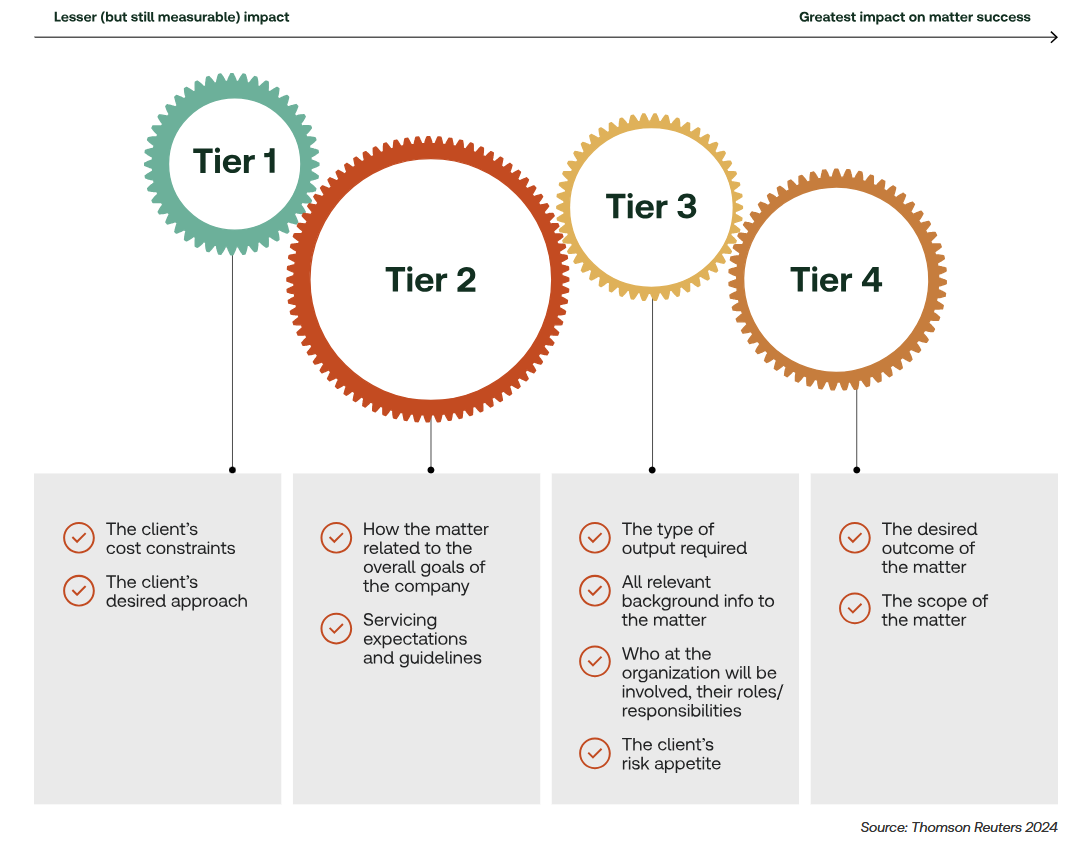In-house lawyers know that process is important and that applies to how their legal matters are handled with outside counsel
It’s axiomatic that no two legal matters are the same. Whether the differences are legal issues, fact patterns, parties – there’s always just enough to make each matter unique. However, that doesn’t mean everything about how legal matters are handled needs to be different. In fact, there are some factors and methods that are repeatable and should be made into a regular process for the sake of securing a successful outcome.
Let’s define successful outcome in regard to a legal matter. First, there’s no guarantee that every legal matter will be won or have the best possible result. Success does not have to be defined by wins and losses, however; speed of outcome, minimization of award value to amount claimed, staying within budget – all of these factors and more can be major contributors to how clients define a successful outcome.
In the recent Secrets to Successful Matters report from the Thomson Reuters Institute, we explored some of these secrets and found there were several key steps that can help both parties arrive at a matter outcome that meets the client’s definition of success as closely as possible.
Among those steps, putting in place a process to ensure sufficient clarity when clients and outside counsel are briefing new matters was considered one of the most impactful. While the specifics of the information to be conveyed will change from matter to matter, of course, having a process in place to ensure sufficient clarity helps ensure a meeting of the minds between outside counsel’s approach and the client’s vision.
The report revealed a multitiered framework at work in this process
On the lower end of the spectrum, clients should communicate information regarding cost constraints and their desires for resource allocation, whether that be law firm staffing, utilization of alternative legal service providers, or similar requests. These steps are foundational, and they likely will only have a smaller impact on how closely the outcome of the matter meets the client’s definition of success. Without this information, however, it becomes harder to meet those client expectations that are further up the checklist.
Matter briefing checklist
Boosting matter success by putting in the work early

Interaction of clients and counsel
In the next impact tier, clients and outside counsel should set clear parameters around how the matter relates to the overall goals of the client company. We know that corporate general counsel value outside lawyers who can provide commercially viable advice attuned to the broader business needs of the enterprise. Outside counsel’s understanding of those business needs can be created or bolstered by effective matter briefing at this stage. In this tier, clients should also be communicating their expectations around the level of service they expect to receive and any guidelines of which outside counsel should be aware regarding those service expectations.
Clients and their outside counsel should also be aware of how a matter is briefed in terms of the type of output required, relevant background information, who within the enterprise will be involved, and just how much risk the client is willing to take on.
Further, when law firms understand their clients’ expectations around the output required, it can take clients’ servicing expectations to the next level. This information may seem overly simplistic, but most GCs can recount situations in which a relatively simple question was met by an overly complicated response from outside counsel. This can be avoided if the client has been clear in conveying what they need to see, and outside counsel then operates within that framework.
It is also vital to ensure clarity of background information. Too often, information accompanied by a client’s statement like “Oh, did we forget to mention…” can have a dramatic impact on the bigger picture. At this stage of the briefing, it is perhaps better to share too much than to limit the background information provided to counsel.
Clients and their counsel should also have a clear discussion about clients’ risk appetite. Some legal matters are worth fighting to the bitter end, while others are best handled with a quick resolution, even if it is less favorable financially.
Additionally, it is important for outside counsel to be made aware of who else from the client’s team will be involved. If outside counsel is expected to provide commercially attuned advice, they need to know whom they are advising beyond just the GC’s office. It’s not that the base substance of the advice will change, but the delivery mechanism and how that advice is tied into the interests of the business can be more fine-tuned if this information is known.
Clients and their counsel should also have a clear discussion about clients’ risk appetite. Some legal matters are worth fighting to the bitter end, while others are best handled with a quick resolution, even if it is less favorable financially. This risk appetite briefing should include not only the financial and legal risk level the client is willing to accept, but also, crucially, the level of reputational risk as well.
The scope of the matter, too, is vitally important. This expectation, like many others on the checklist, may evolve as the matter progresses. In fact, the concept of revisiting matter scope is a well-recognized step in the project management process. However, scope cannot be revisited if it is not initially defined.
Finally, a matter briefing should include a clear communication of the desired outcome, as well as a thorough examination of the scope of the matter. The first item here should be obvious, yet our research revealed that too often this basic communication is overlooked. Indeed, this factor has the greatest potential impact on how clients and their outside lawyers rate the success of a matter’s outcome.
The importance of process
A majority of outside counsel surveyed for the Secrets to Successful Matters report stated that they did not receive sufficient clarity on at least half of the items on this checklist, negatively impacting their ability to deliver matters that met the client’s definition of success.
Perhaps this frequent lack of clarity is because of an absence of a repeatable process. Tools like the above checklist can provide a valuable starting point. Indeed, the exact wording of the checklist may vary, and it can and should be tailored to the needs of individual clients or law firms.
The onus is not just on the client either. Law firms would do well to implement their own checklist process. While the client should be looking to volunteer all the necessary information and expectations to help guide a matter to success, attuned outside counsel should also be asking the right questions to ensure they have the necessary information, guided by their own experience of working with a wide variety of clients.
Lawyers love process. To be fair, that’s probably an overstatement as many processes with which lawyers must comply are complex and perhaps a bit arcane. Process, however, is undoubtedly ingrained in the lawyer’s mindset. And by creating a repeatable process to foster a meeting of the minds between client and counsel, both sides will be taking a well-advised step on the path to ensure more frequent success in matter outcomes.







